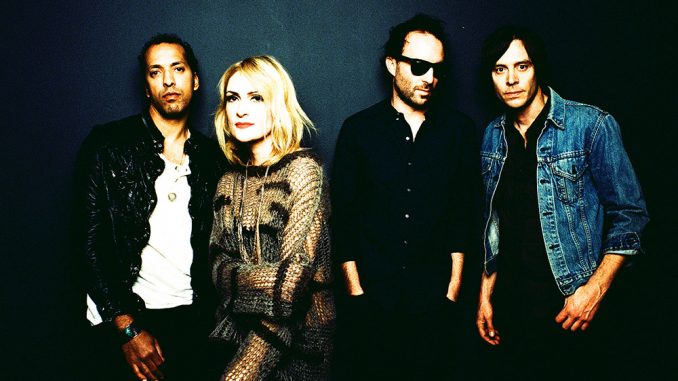
Jimmy Shaw, guitarist of the Canadian indie rock band Metric, has a love/hate relationship with waiting.
Getting his start at The Juilliard School in New York, Shaw went from performing classically, to learning how to produce to meeting Emily Haines and starting the band.
Producing is a passion he said he’s always had but developed further out of a growing disdain for staying stagnant.
“All the things we do outside the music itself was born out of the necessity of not waiting for other people,” Shaw said. “Our organization is very nimble and quick to be able to do things we want to do.”
Metric’s takeover arguably began with its hits “Help I’m Alive” and “Gold Guns Girls” off of its album “Fantasies” in 2009, which was self-produced by Shaw. He said the band didn’t think about following up the album when writing “Synthetica.” Instead, the group waited until the songs came to them.
“I think we just followed the sound because musically, we were interested in it,” he said. “It was very much about going in the studio and starting off with ‘Fantasies’ and going through exploration and waiting for things to feel new.”
With Shaw receiving a Producer of the Year award from the Juno Awards in 2013 for songs “Breathing Underwater” and “Youth Without Youth,” that “new” sound may have just been achieved.
It’s been more than a year since Metric’s “Synthetica” was released, but the band continues to promote it on a support tour with Paramore.
Shaw said as Metric wrapped up the album’s original tour, it sat and waited, thinking about the next step. Shaw said he “didn’t want to let [the album] sit and die out.”
When Paramore asked Metric to join on its tour, the band jumped at the opportunity.
“It didn’t feel like we could do the same tour again,” Shaw said. “We needed to do something different and switch it up a bit. It made a lot of sense to us. We felt like [Hayley Williams’] fans would react very much to our music.”
That reaction stems from a combination of sound, networking, exposure and social media.
With Metric being about 15 years old, the group was able to see music’s technological revamp with its own songs. With its first album “Grow Up and Blow Away,” which was released in 2001, to “Fantasies” in 2009 and “Synthetica,” its latest project released in 2012, Shaw saw the YouTube hits and iTunes downloads climb.
“It was a bizarre transition,” Shaw said. “We lived through this transition. We went from a time where a record existed only physically to now digitally. It’s really changed a musician’s perspective.”
Now, Shaw said, it’s about maintaining and dominating a social media presence, which can sometimes compromise a band’s sound, though he said he feels Metric hasn’t fallen into that trap.
“Now, you have to be a public figure of all kinds,” he said. “It’s not enough to play an instrument or write songs anymore.”
Shaw is classically trained from his attendance at The Juilliard School, where he also performed with the New York Philharmonic Orchestra. It was there that he eventually grew tired of playing classically, realizing it was worthwhile but might not be for him.
“For the most part, for me it was based to do a desire that had a lot of freedom,” Shaw said. “I wanted to do something that you could use music that could express feeling. I wanted to write, I wanted to create.”
Along with writing and creating with Metric, Shaw is also known for his work with Broken Social Scene, a collaborative indie rock effort that includes up to 19 members. The musicians that perform with Broken Social Scene also have other projects to their names and include members of Stars and Leslie Feist, among other big names in indie rock.
Shaw and Haines, Metric’s lead singer, keyboardist and co-songwriter, joined Broken Social Scene at a time when it was transitioning from an instrumental sound to the sound its known for today, though their involvement has died down with the pursuit of Metric’s own ambitions.
“It was very much an amorphous blob of indie rock,” Shaw said. “Anything could happen at any moment. As it went on over the years, it became difficult to maintain that level of chaos.”
However, Shaw said he valued the time spent with the supergroup and that it was “totally rewarding getting together with those people.”
Though he tries not to let the fame get to his head, Shaw said there are moments when he looks around at the members of Stars, Tokyo Police Club and Leslie Feist and is glad to call “those people” his friends.
Shaw will be performing alongside his new friends in Hellogoodbye and Paramore on Friday at the Susquehanna Bank Center.
Patricia Madej can be reached at patricia.madej@temple.edu.


Be the first to comment